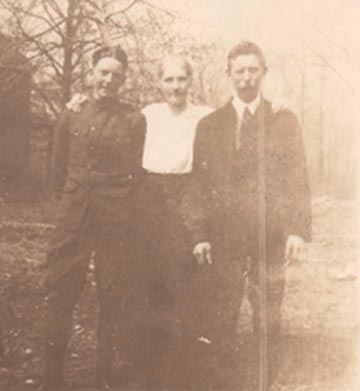 
GEORGE A. MORRICE WITH FAMILY This letter was found in the papers of George A.Morrice sometime after his death in the 1930's. It appears that it was never sent and it is possible that it was written sometime after the war and he just chose the letter style for convenience and comfort in recounting his service in France. SOME WHERE IN FRANCE.
I went up for my first trick in the trenches on Aug.21. Five of us had been
sent to school and were back about two days when, through the kindness of
Jerry, several fellows were sent back to the soldiers paradise (a hospital)
We had to go up to take their places. We went up that night with the ration
limbers. It took us three and a half hours steady going to reach our station.
We hadn't been there five minutes when we had our closest call. Jerry must have observed our party coming up and he started dropping shells all around us. Two came too close for comfort. The others didn't bother us. It might interest you to know that it doesn't require much energy to duck when a shell tries to make your acquaintance.
I don't believe there is anything that can hold a fellow's interest as completely as a trick in the trenches. There is always something interesting
going on. No matter where you go up there you always hear singing. The shells are very entertaining that way they sing 'nearer my God to thee' 'When I leave the world behind' and 'you may linger but I'll get you yet'. But Jerry is the one who gets the most music. For every shell he send he gets about ten back.
After you have been up there a couple of hours, you have had experience with
everything that Jerry sends over and you get used to it, and as long as they
don't become too intimate, they don't disturb your work. When you're repairing a
wire and you hear a bullet whistle past, you know a sniper is on the job, and
it gets your goat not to be able to return the compliment. To do so is foolish because the flash of your gun gives your location and then some hungry machine gun is looking your way. The only thing to do is tumble into a shell hole and kid Jerry into thinking that you've been hit. And then when you think he’s satisfied go ahead with the line. I had one experience that way. The fellow I was with had had several so he knew what to do.
You ask what the signal corps does in modern warfare. I wish you had asked what we don't do. That would have been easier. The main idea is to keep communication as perfect as possible under all conditions. It doesn't matter how it is done so long as it is done and we run up against some hard jobs. Our company is an outpost company. The main method is by buzzer or telegraph. Ten words a minute is all that is required and I have managed to make that. We have to lay the lines and cables and repair them. If they are not broken about eight times a day, the day is considered a failure. In the forward area they are laid anywhere on the ground. They sure are a lot of trouble.
We also have to establish and run the stations. Next is the visual, mostly by lamps and shutter. That is only used in the pinch and messages are sent from the front only. If they are sent from the rear to the front, Jerry can read them, and although in code there is too great a risk, because he would locate the signal station and fire on it.
Flag signaling is absolutely taboo. If it became necessary to use flags, one should kiss himself good bye before starting because Jerry is sure to see him and clip him. When everything fails they use the old method of runners. That generally means six or seven men with the same message and if one gets there it is considered a success. We also handle the telephone communication, and at times signaling to airplanes. That is a tough proposition. When we are actively engaged we have our hands full. I got about five hours sleep in three days when we were up. But Jerry is getting his. I've got a German ten-cent piece for a glass of beer when we’re in BERLIN.
 NOVEMBER 12, 1918 - APRIL 5, 1919 NOVEMBER 12, 1918 - APRIL 5, 1919


|